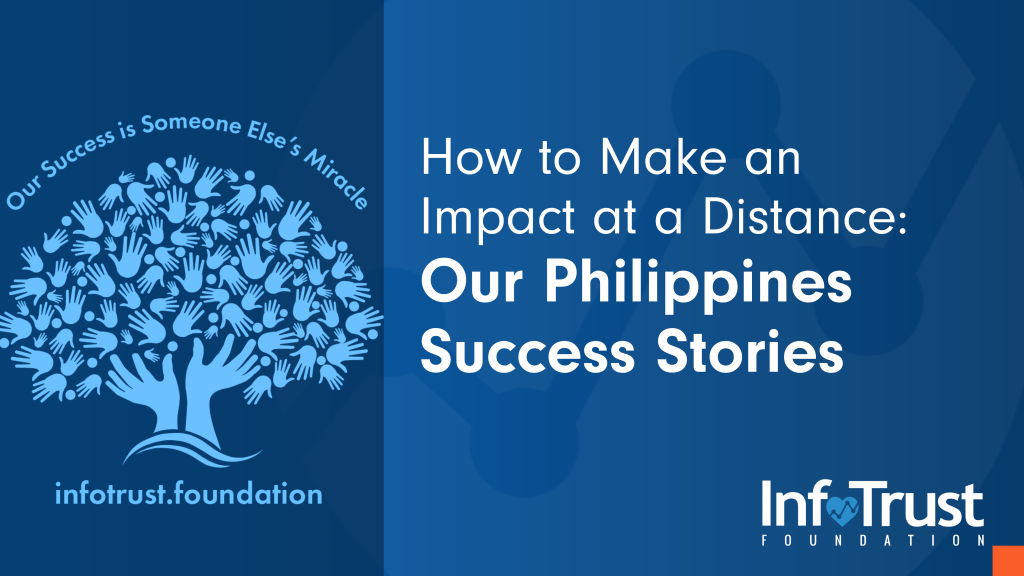I was born and raised in the Philippines, and as a child, my parents taught me the importance of charitable works. I distinctly remember packing rice and canned goods to distribute to the residents of my late father’s hometown in Quilitisan, Calatagan, Batangas, Philippines. I learned from an early age that giving back to the community wasn’t just a good thing to do—it was essential. Giving became one of my core values.
That’s one of the reasons I was so drawn to InfoTrust. The company’s core values align with my own, and as a result, I’ve had invaluable opportunities to extend my reach and give back to my community in the Philippines in really meaningful ways. In 2017, we distributed school supplies to 200 students at a childhood development center in my hometown, Malabon City. The students who attend this school don’t have many resources, and even the most basic supplies can make a huge difference in their education.
Since then, we’ve expanded our efforts in the Philippines and have touched an ever-increasing number of lives. In 2018, we provided food to more than 500 children in orphanages. The following year, we expanded our school supplies program to reach more than 300 children, and this year, we’ve provided relief goods to hundreds of families and first responders.
If you live far from your hometown or country, it can be difficult to feel like you still have the power to make a difference. But if you have a big heart and you’re willing to dedicate your time, I assure you—you have the power to change lives. For anyone looking to start a charitable initiative at a distance, here are some of the most valuable lessons I’ve learned along the way.
Have People You Trust on the Ground
Because I live in the United States, I knew I wouldn’t be able to physically lead our operations in the Philippines. I needed to rely on people there that I could fully trust. It’s impossible to oversee operations from a distance, so before you even begin, you need to know that your contacts share your values and vision and will implement them faithfully.
Even if you have a group of dependable people, I recommend choosing a primary contact to streamline your communication. That way, you only need to coordinate directly with one or two people, who, in turn, will communicate with volunteers. My dependable partners came in the form of family members. In 2017, that meant my girlfriend (now wife) and my sister-in-law, who oversaw the budgeting and the purchase of goods.
If you don’t have a family member with whom you can collaborate, my second suggestion is to seek out trusted friends. Your third option is to partner with a local group, but you must really believe in them and make sure that your principles and perspectives align.
These go-to individuals are important not only because they help put your plans into action but also because they know more directly what people in the community need. Local partners with practical know-how and huge hearts are indispensable if you want to begin a successful project abroad.
Build a Team of Teams
The internet makes it much easier and cheaper to maintain open lines of communication with your international team. Nevertheless, even in a world with continuous communication, be careful not to overburden your team with micromanagement. I’ve found that the most successful initiatives are those where volunteers and organizers feel empowered to make their own decisions. Once you’ve recruited a passionate, responsible team, trust that they know what’s happening and can make assessments independent of your input.
I learned this principle from General Stanley McChrystal’s book Team of Teams. McChrystal was the commander of the Joint Special Operations Task Force in charge of defeating Al Qaeda. McChrystal reflected that in order to have a faster flow of information and more agility, they needed to form a “team of teams.” When you give small groups the freedom to act, they can make better, faster decisions than a hierarchical command structure.
This insight has also driven some of our philanthropic choices. This year we partnered with my dear friend Ma. Lamuen Chu to provide free meals to hospitals in support of pandemic first responders. We took advantage of my friend’s expensive local knowledge, business contacts, and family and friends in order to efficiently purchase, package, and deliver the food where it was most needed.
Then, in mid-November, when Typhoon Vamco struck the Philippines, we worked with this same group of collaborators to ensure that 500 devastated families received much-needed relief goods. Having a team of teams made it possible for us to respond quickly and maximize our impact.
Always Remember Your Core Values
When you’re in charge of this type of project, you will experience highs. On the days I knew we were handing out supplies, I would get so excited, I couldn’t sleep the night before. First thing in the morning, I’d want to hear every detail: how the distribution went, how the kids responded, how everyone felt.
But of course, there are always challenges. Things don’t always go according to plan. Miscommunication happens. Balls get dropped. When those things happen, it’s important to remember your core values. What made you start this journey in the first place? My core value is giving back to the community—not just my family and friends, but the community as a whole.
That core value reminds me that giving isn’t just about money or supplies. It’s about dedicating your time, offering your passion, and showing others your appreciation and gratitude. When we give students school supplies, we aren’t just giving them pencils and paper. We’re giving them possibilities and hope; we’re giving them the narrative that others care. The act is much more important than the amount.
Instead of focusing on the many elements of life you can’t control, remember your core values and know that no matter how big or small your contribution may feel, you’re making a difference. Every ounce of energy and care that you give will expand and cause a ripple effect. It will inspire others and help your initiative scale.
Trust Your Heart, and Everything Else Will Follow
Thanks to the InfoTrust Foundation, I’ve had the chance to oversee our international efforts in my home country and create meaningful change for my community. I am truly blessed, and I’m grateful to everyone who has made this project a success. I trust that we have even more success in the future.
Still, none of it would have been possible without the help and support of family members and dear friends. If you want to make a difference in your home country or town, find individuals that you truly believe in, who share your values. As long as you have the right team and the right intentions, the logistics, funding, and organizational structure will follow.


